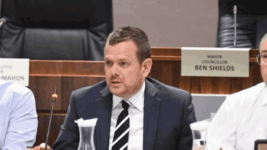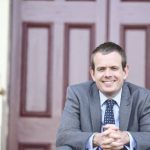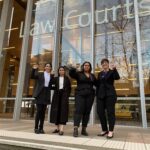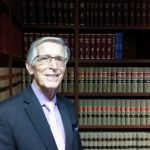Turning Lip Service into Action: An Interview with Labor Candidate Stephen Lawrence

The recent wipe out of the Liberal Nationals in Victoria does not bode well for the Perrottet government in NSW. And with a state election looming next March, it’s more than likely that the Coalition will soon be dislodged from its now over a decade in office at Macquarie Street.
And running on the Labor ticket for the NSW Legislative Council in the upcoming election is well known barrister and co-host of the popular legal podcast the Wigs Stephen Lawrence, who’s promising to be a strong Labor voice for regional NSW.
Indeed, Lawrence is further pledging to speak on behalf of the disenfranchised in the community and focus on the human side of the equation when it comes to policies, which is something that Nationals members tend to overlook as they prioritise profits over all else.
The lawyer is also extending his arm out to those in Dubbo who don’t usually vote for Labor, signalling that if they can overlook their usual affiliations when it comes to the upper house, the region could have two representatives, which can only be of benefit to the entire community.
Tangible improvements
Lawrence just spent the last four years as a member of Dubbo Regional Council, and his last 12 months in office, saw him holding the position of mayor. And as he tells it, he ran for local government with some very clear goals on what he wanted to achieve, and these came to fruition.
The then Country Labor councillor had long seen the need for a drug rehabilitation centre in Dubbo that would have the capacity to service the entire region, as without that sort of option for people in need, their health issues were being confined to the criminal justice system.
The campaign for rehab services in western NSW included a range of civil society groups in support of it, and working within local council, Lawrence was able to rally the entire body around the issue, which saw the state Coalition government finally come to the table in late 2020.
But the advocacy didn’t stop there, as a further need for a regional drug court had been identified, to divert local drug offenders away from prison, which the state government also agreed to in mid-2021, whilst Lawrence was holding the top office in local council.
A whole-of-parliament approach
Lawrence underscores that the way he was able to ensure these long sought-after proposals were accomplished was that he worked with the entire local council on the issue, which entailed looking beyond party lines.
And the NSW barrister explains that he’ll be taking this approach with him to the Legislative Council, so that when it comes to achieving tangible improvements for the state constituency, Lawrence will be willing to work with all in the upper house chamber to attain them.
Sydney Criminal Lawyers spoke to Labor candidate for the NSW Legislative Council Stephen Lawrence about the need for the prioritisation of the human element in the approach to governing NSW, which has been sorely lacking over the 12 years of Coalition government in this state.
In mid-October, it was announced that you’ll be running on the NSW Labor Legislative Council ticket in the March 2023 state election.
In running for pre-selection, you asserted that “Country NSW needs a strong Labor voice” and that’s what you’re offering.
So, Stephen, now that it appears you might well be providing that voice, what can regional and rural NSW expect from you?
People who are considering voting for me in the upper house might want to look at my record in local government.
I showed in my time in local government that I’m not involved in politics for a career, and I’m not involved just for the sake of being there.
I regard public office as only useful and only to be sought if one has an intention and capacity to make real, meaningful and progressive social change.
In local government, that meant I orientated the entire council organisation to focus on obtaining for the Dubbo region many tens of millions of dollars in drug treatment resources after a vigorous campaign that was paid for and run by council as an organisation.
We ultimately received funding for our objectives, which was a drug court, a residential rehabilitation centre and a youth koori court. Those were the main reasons I got involved in local government, and I didn’t run again.
One of the main reasons that I didn’t run again was that I had achieved what I set out to achieve.
So, if I am elected to the NSW upper house, people can expect that rather than being there for a long time, I will be there for an eventful and effective time.
And unlike the National Party, I won’t be focused on the interests of people who, frankly, don’t need an advocate.
I will be a voice for vulnerable people, for disadvantaged people, for people struggling with cost-of-living pressures, and all the pressures of modern life.
So, I will be a representative for the large majority of people.
I will do it in an effective way. I will be particularly focused on issues that I see as important in country NSW, which, of course, include health, education, proper access to housing and the issues I’ve long been passionate about, such as justice reinvestment and drug treatment services.
During the mid-October Labor state conference, you raised the housing crisis this state’s currently facing and you highlighted the need in regional NSW. You put it down to “a dire lack of planning by a failed state government”.
So, given the likely change of government early next year, how do you consider the approach to housing in NSW will be reformed under Labor leadership?
I won’t preempt the announcement of our housing election policies. I will leave that up to the shadow minister Rose Jackson.
But I’ll say this, we have already announced some policies, for example, an end to no fault evictions for tenants.
It is not acceptable, when vacancy rates are at decades low level, that people can be evicted for no reason other than the whim of the landlord.
But I would also expect that a Labor government will focus heavily on the provision of social housing.
The reality of this government is the social housing waitlist is currently at about 50,000, and yet, the government has sold off 4,205 social housing properties since they came to government.
And the 23,000 supposed new social housing dwellings that they promised would be delivered between 2016 and 2026 are not on track to be delivered.
From a regional perspective, I was mayor of Dubbo last year, and I’ve just done four years on council.
I brought together a stakeholder group in housing to work on reforms to this area, and I noticed in that process, a complete lack of real leadership from the government.
They’re big on slogans and talkfests, but when the rubber hits the road in a place like Dubbo, with a dire shortage of medium and high density and a much-needed boost to social housing, we simply didn’t see the state government come to the table with anything meaningful.
As you’ve mentioned a key priority for you when you were both mayor and a local councillor in Dubbo was the establishment of a drug rehabilitation centre for the region, and on that being achieved, seeing a successful push for a local drug court.
Why were these a priority for you? And is reform in this regard something you see the need for more of in this state?
The reason it was a priority for me is my understanding of the role of an elected official is to identify what are the most important and pressing areas in terms of improving the lives of people.
I knew from my years of working at the Aboriginal Legal Service, that just about the biggest social issue in our region is the entrenched social disadvantage that leads to and is perpetuated by Aboriginal overrepresentation in the criminal justice system and that is, significantly, a drug and alcohol issue.
So, when I got elected to Dubbo Regional Council in 2017, I was always going to and successfully did throw my energies into achieving lasting improvements in that area.
We ultimately secured the commitment to the rehab centre and the drug court. And while we are yet to see either opened, I would expect both to open next year.
For me, if I get the opportunity to be on the broader stage of state politics, I will take that focus statewide.
I’ll be a strong voice inside the Labor Party for the rolling out of drug courts across country NSW and for a very significant increase for funding for drug treatment services because we currently have about a third of the services that we need.
I’ll be a passionate and vigorous advocate on these matters because I am absolutely sick of the lip service that is given to these issues.
I am sick of the inquiries and the talk. It is time for serious and sustained action on drug treatment services, and time to turn all the words about Aboriginal overrepresentation into action.
I will also be a very strong voice inside the Labor Party for change to the absolutely shameful situation that sees Aboriginal legal services chronically underfunded, as compared to mainstream services.
We see a lot of mealy-mouthed and meaningless words from politicians on the issue of Aboriginal overrepresentation. Yet, they seem quite happy to let the situation of gross disparity between Aboriginal legal services and mainstream legal services continue.
You’re also a well-known barrister with a social justice focus and further, you’re one of the presenters of popular law podcast The Wigs.
With your insight into the NSW criminal justice system, what sort of further reforms do you think should be prioritised in this area?
It’s important for me, as someone who has been an outspoken lawyer and a bit of an activist lawyer in terms of the cases that I have chosen, to deal with the reality that, as a Labor candidate and potentially a Labor parliamentarian, I’ll be advancing the Labor agenda.
I won’t be advancing my own personal views that I might have expressed in the past.
I can certainly do those things inside the Labor Party. But my role will be to be a Labor voice on these issues. That is the basis on which I’ll be elected if I am.
But I will certainly be a strong voice for justice reinvestment, for drug courts and for a broad range of policies that put at the forefront the perspective that interaction with the criminal justice system worsens a person’s risk of future engaging in criminal offending.
So, when we’re talking about street offences and offences, for example, that are not a threat to public safety, we need to have that perspective at the forefront, because the aim of all this is to have a happy and healthy society.
Although sometimes our criminal justice system, in the way that it operates, is not always consistent with the pursuit of that fundamental objective.
Recently, you’ve been in the press, outlining that the Dubbo region could have two representatives in parliament and because of this, you’ve called on local constituents to look beyond their usual party affiliations when voting for the upper house.
Can you elaborate on why non-traditional Labor supporters should consider overlooking their usual preferences when it comes to you?
What I’ve been saying to the people of the Dubbo region is that effectively you do have two votes. You have a vote in the lower house where the government is formed, but you also have a vote in the upper house, for the house of review.
Obviously, our system of government is very much a party political one and people recognise that.
But there is a whole range of things that parliamentarians do that are not party political, and I would like to think that I’ve demonstrated during my time in Dubbo Regional Council that I am an effective and strong voice in the interests of the Dubbo region.
So, what I am saying to conservatives is, “You might not like everything about my politics. But I hope that you respect me. And if you respect me and you do think it is going to be good for Dubbo, then I want you to strongly consider a vote for Labor in the upper house.”
If I’m elected, then Dubbo will have two elected members in parliament and people know from my time on council that I am open to everyone.
I will talk to everyone. I will advocate for people on their issues in government, and I will always be an advocate for the Dubbo region.
And lastly, Stephen, NSW Labor is saying, “It’s been 12 years, it’s time for a change.” The Coalition has been in power in this state for a prolonged period.
So, what sort of differences would you say NSW is going to experience foremostly under a Labor state government?
The changes will be massive. We have committed to a ban on further privatisation. The government has sold off $93 billion worth of assets since 2011.
Their more recent decision to privatise two of the three energy distributors has led to super profits, with people serviced by Endeavour or Ausgrid paying an extra one hundred to two hundred per year, compared to the still state-owned Essential increase of only $10 a year.
So, they’re privatisation mad. And that will end.
We have already committed to a very significant boost to paramedic numbers. We have already committed to a huge boost in permanent teacher numbers.
The thing about Labor governments is we prioritise and allocate more resources to services like health and education.
What this government has done is engaged in a mass privatisation project and spent the proceeds in a reckless way.
They have certainly built some big infrastructure with it, but it’s sorely lacking on the human side.
So, we have some new hospitals, but we don’t have them properly staffed. We have some new schools, but we don’t have them properly staffed.
A Labor government is going to put people first and focus on the human side of every policy issue.







